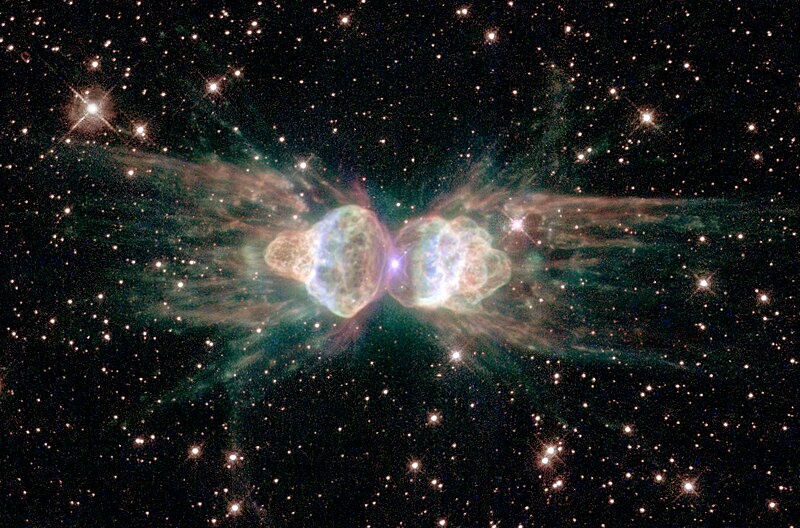Archivu:Ant Nebula.jpg

Tamaño de esta previsualización: 800 × 528 píxeles. Otras resoluciones: 320 × 211 píxeles | 640 × 423 píxeles | 1072 × 708 píxeles.
Resolución máisima (1072 × 708 pixel, grandol el archivu: 1,14 MB, MIME type: image/jpeg)
Estorial el archivu
Pursa nuna fecha/ora pa vel cumu era el archivu nesi momentu.
| Fecha/Ora | Cuairu | Miias | Usuáriu | Comentáriu | |
|---|---|---|---|---|---|
| atual | 01:04 1 Heb 2008 |  | 1072 × 708 (1,14 MB) | Papa November | Full res version from source |
| 01:01 1 Heb 2008 |  | 1072 × 708 (148 kB) | Papa November | Uploaded full resolution image from source | |
| 14:30 29 Ene 2008 |  | 600 × 362 (69 kB) | Nk | {{Information |Description=The Ant planetary nebula (Menzel 3 or Mz 3). STScI-PRC2001-05 This NASA/ESA Hubble Space Telescope image reveals the ant's body as a pair of fiery lobes protruding from a dying, Sun-like star. Though approaching the violence o |
Atihus
El siguienti artículu atiha a esti archivu:
Uso global del archivo
Las siguientis güiquis gastan esti archivuː
- Uso en af.wikipedia.org
- Uso en an.wikipedia.org
- Uso en ar.wikipedia.org
- Uso en ar.wikiversity.org
- Uso en arz.wikipedia.org
- Uso en ast.wikipedia.org
- Uso en ba.wikipedia.org
- Uso en bg.wikipedia.org
- Uso en bjn.wikipedia.org
- Uso en bn.wikipedia.org
- Uso en br.wikipedia.org
- Uso en ca.wikipedia.org
- Uso en cbk-zam.wikipedia.org
- Uso en ce.wikipedia.org
- Uso en cs.wikipedia.org
- Uso en de.wikipedia.org
- Uso en en.wikipedia.org
- Astronomy
- Norma (constellation)
- Talk:Outline of physical science
- Mz 3
- List of planetary nebulae
- Portal:Astronomy/Picture/May 2005
- Portal:Astronomy/Picture/August 2005
- Portal:Astronomy/Picture/17 May 2005
- Portal:Astronomy/Picture/10 August 2005
- Portal:Astronomy/Picture/Week 01 2006
- User:King Zebu
- User:Exoplanetaryscience/sandbox
- Uso en en.wikinews.org
- Uso en en.wikiversity.org
Ver más uso global de este archivo.


